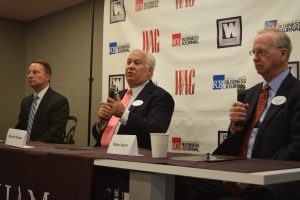There was no real disagreement that government spending can spiral out of control. Or taxes can be too high. Or regulations can be too burdensome.
But just how serious the problems are, where exactly they lie and how to fix them, now those are questions worth wrestling with.
And that”™s what three panelists did on Sept. 27 at the Fordham School of Professional and Continuing Studies in West Harrison.
The question posed: Is government choking business?
One side advocated a common sense, business-like approach to running government. The other side proposed a non-ideological, evidence-based method of running the people”™s business.
Overregulation costs $3 trillion a year, said Walter Raquet, who has years of experience in executive positions and who recently authored the book, “Government is Killing the Economy.”

The economy has grown by just over 1.5 percent a year for 15 years, compared with 3.5 percent over the previous 50 years.
“It”™s just crippling job growth,” he said. “And this overregulation is just going to get worse.”
He called for a bipartisan group of business executives and industry experts to recommend common sense solutions for making government work like a business.
“We have the most incredible executive talent in the world,” he said. “People would volunteer one or two days a week to help make this country better and stronger.”
So why are New York City and its suburbs, where taxes are high and regulations stiff, prospering, asked Richard Brodsky, a lawyer and former member of the New York State Assembly, while upstate regions with lower taxes and regulations are hurting? The anti-tax, anti-regulation point of view should be tested on an evidentiary basis, he said.
Westchester has the highest taxes in the United States, said Rob Astorino, the county executive. “Government feels it should take your money and do what it wants, versus you working hard and employing people and making the economy.”
Look at the income tax, Raquet said. There are 74,000 pages of regulations. Corporations fork over $288 billion and pay another $300 billion to advisers who work on tax issues. The government fails to collect about $300 billion a year.
And buried in those regulations are $1.5 trillion in “carve outs,” tax exemptions that shift the burden to everyone else. If you got rid of those exemptions, he said, “we”™d have a 10 percent income tax and probably collect more money.”
He said costly Sarbanes-Oxley financial regulations were put in place because financial scandals such as Enron, but the regulations won”™t prevent the next fraud. What”™s needed instead is a whistleblower program that gives people big rewards and offers immunity from prosecution if they come forward when a crime is being committed.
But one could argue, Brodsky said, it was the repeal of the Glass-Steagall Act, which had separated commercial and investment banking, that contributed to the 2008 financial disaster.
“There has to be a balance, a yin and a yang,” he said. Give me an example of regulations that cost us $1 trillion, he implored.
Securities and Exchange Commission rules in 1997 cost 18 million jobs over 15 years, Raquet replied. The U.S. used to do 700 to 1,000 initial public offerings a year. Only 31 have been done this year.
Brodsky conceded the economic consequences of the SEC regulations, but he countered that it was unregulated elements in the financial community that took the country down in 2008.
Why is it that neither Democrats nor Republicans, he asked, ever come up with common sense solutions?
“Because they are conflicted,” Raquet said.
“It”™s a corrupt system?” Brodsky prodded.
“It”™s a corrupt system,” Raquet agreed.
“I don”™t buy that,” Brodsky said.
The system is not necessarily corrupt, Astorino said. But it is built to be inefficient.
“Government feeds off itself. Government to survive by its very nature needs to grow,” he said. “It is a system built on mediocrity and inefficiency.”
He said regulations are needed, but New York has 750,000 on the books. The state Senate has identified 3,000 that should be removed immediately. Yet, nothing has happened.
“The biggest ones are choking us to death,” he said.
That”™s rhetoric, Brodsky said. For every example of ridiculous regulations and of places that have prospered by cutting regulations, he offered counter examples.
Don”™t rely on his position or on anyone”™s ideological position, he said. Test. Look for evidence. Apply rigorous intellectual standards to judging what works and what doesn”™t.
About a hundred people attended the forum. Bob Berkowitz, a founding correspondent for CNN, was the moderator.
The event was sponsored by Fordham and by Maureen C. Jacobson, founder and owner of MCJ Business Advisors LLC. It was presented by Westfair Communications, publisher of the Fairfield County Business Journal and Westchester County Business Journal.




















It was interesting that at the end of the program Rob Astorino stated that the middle class is always in the pressure cooker spot, paying the bulk of government’s costs, as the rich have ways to avoid paying taxes and because of their contacts, have carved out niches to protect themselves. Immediately following that, Mr. Raquet again suggested that successful business people be the ones to advise and propose solutions to the problems we face…it was clear to me that this is a conflict to interest as those who benefit the most from the system would be in charge of the hen house. It is those same people who will benefit handsomely from the actions they have and will again propose. There is simply no way those actions benefit the nation. Mr. Astorino and Mr. Raquet may talk a good game, but ultimately their only goal is to maintain the status quo, keep the middle class paying the bills, and let the top 1% garner all the economic growth there is. This is not reforming government, this is entrenching an already failed system.